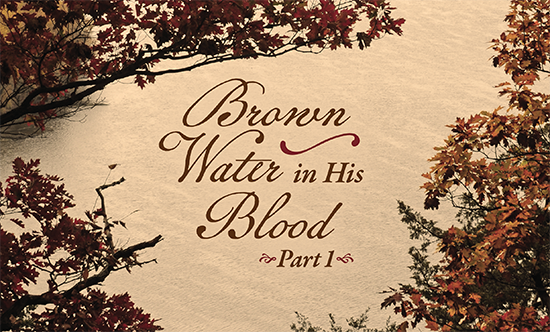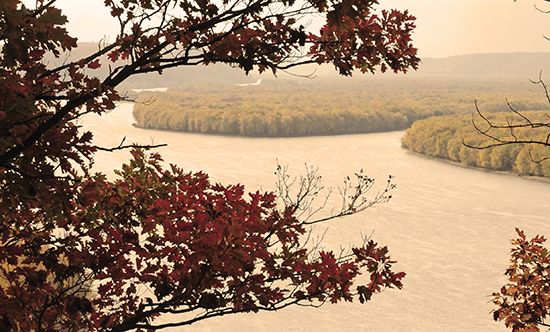
June-July 2019
Kaleidoscope:
The Multifaceted
Body of Christ
------------------
|





Brown Water in His Blood, Part 1
By Bill & Brenda Evans
When you’re born at the junction of two rivers, you might have brown water in your veins. At least David Smith does. As a child in Catlettsburg, Kentucky, his family’s backyard butted up against the flood plain of the Big Sandy River where it emptied into the Ohio. He dreamed of riding the Ohio. By his senior year, David worked for the Merdie Boggs Company in their riverboat store. A year later, in 1974, he became a deck hand on a Boggs boat. Three years after that, he sat for the U.S. Coast Guard’s pilot’s exam, passed, and got his steerman’s license, a one-year permit of sorts. The next year he became a certified riverboat pilot. He’s ridden brown water since.
Early on, David piloted and captained 20 years for Ashland Oil, hauling petrochemicals from Ashland, Kentucky, to New Orleans. Today, he is owner of River Marine Enterprises, LLC, based in Paducah, Kentucky, now the hub of riverboat traffic for the Ohio, Tennessee, Upper and Lower Mississippi, and Missouri rivers.
In short, David is a riverman. For 45 years, brown water has been the road he travels. Recently, his brown-water haunt has been the Missouri, the longest river in North America. For 2,341 miles, the Missouri lives up to its other names—Mighty Mo and Big Muddy. In the early 1900s, George Fitch, a Midwestern newspaperman, said the Big Muddy has a personality, a sense of humor, and a woman’s fickleness: “It plays hide and seek with you today and tomorrow follows you around like a pet dog with a dynamite cracker tied to his tail.” David knows the Missouri. As owner, captain, and pilot of towboats, he studies its personality, its moods, and the people who dare ply its brown water.
The first thing you learn in a conversation with David is what you don’t know about rivers, rivercraft, and the brown water “rules of the road.” He shows you a 220-page Coast Guard book the crew lives and works by. You learn brown water refers to navigable rivers while blue water describes oceans, and you scan dozens of complex rules of navigation to live by. The second thing you learn from David is he loves rivers; the third is he loves people, and that people come first.
Five family members have worked the river. His grandmother was a cook on a towboat. “She was up at four, had breakfast ready at 5:30, then lunch and dinner, in bed by seven. On the river, you eat fast. You have 30 minutes, but you eat in 15, rest a minute, go to bathroom, then back to work,” David said.
For three generations, the river has been in his family’s blood. “Dad was an engineer. He kept towboats running. He was on the river until three weeks before he died at 75—wouldn’t quit.” David and his two brothers have worked in various positions, as well. His brother Greg died on a river, doing a favor for a friend. “The towboat sank fast. He was trapped in the pilothouse. But when all five of us were together for family dinners, the conversation always turned to the river. That’s just how it was,” he said.

A boat’s crew is important. “Towboats move on the backs of the deck crew,” David says. Deckhands have the hardest jobs, physically, and the most dangerous. They “build tow,” lashing together the towboat and up to 15 barges with one-inch steel cables called face wires and wing wires. Towboats are pusher-craft with square bows equipped with hard rubber “knees” that push against the barges themselves. A usual tow is three barges “breasted up,” side by side, and five barges long. Sometimes, deckhands lash hip barges to the side of the towboat. They work the wires and pumps, drop and pick up barges, clean barges, and stand watch with extra eyes and ears for the pilot, captain, and engineer.
“Making lock” is a duty-heavy job for deckhands and a challenge for a pilot who pushes 15 barges—five long and three wide—through the lock’s chamber with just over two feet of clearance on either side. The chamber of a typical lock like the Greenup Lock and Dam on the Ohio is 1,200 feet long and 110 feet wide. A towboat with its barges is usually just under that size—1,100 feet long and 105 feet wide. For a pilot, making lock is like pushing a 1,100-foot metal thread, weighing 25,000 tons, through the eye of a needle barely wide enough to ease through. All hands on deck! No room for mistakes.
Besides locks, a pilot has to know and read the river and his boat, have good depth perception, not be colorblind, and stay extremely alert to drift (debris), channel markers, other boats. “Every time a pilot moves any one of the four steering levers, he makes a multimillion-dollar decision about the towboat, 15 barges, and the cargo he is pushing,” David says. Piloting is a weighty job, one David hasn’t given up yet, despite his responsibility as owner and captain.
“A line-haul towboat that runs the length of the river becomes your world. Your crew is like a family. You have to get along. I usually run with a seven-member crew: four deckhands; an engineer who keeps all equipment, propulsion, and machinery working; a pilot; and me. No cook. Crews typically do that for themselves now days. Several members of my crew have been with me for years. Most are on 28 days, off 28. Deckhands like 28 on and 12 off because of more pay.”
The crew’s 24-hour schedule is six hours on, six off around the clock. “I usually stand forward watch so I’m on at six, off at noon. Then I’m on again for after watch at six and off at midnight. Finally, I shower and go to bed. I wake up around five and spend time in my duct-taped Bible, My Daily Bread, My Utmost for His Highest, or sometimes Chuck Swindoll on Facebook. I have a quick breakfast and am on again at six for the next 24-hour cycle.”
David was saved at 15, but he grieved the Holy Spirit for years, he says. In his late 20s he went to a revival in Ashland, Kentucky. Milton and Melvin Worthington were the evangelists. Ed Cook was pastor. “I planned to just go one night—no more—but went back every night and haven’t quit.”
Thirty-one years ago, he married Chariot. “It’s good to be equally yoked. I was on the river before we got married, so she knew what she was getting into. She gee-haws on the right path, is self-sufficient. Once this past year, when I was gone four month, she didn’t complain. She prays, helps me grow spiritually in the tough times.”
Getting along with people is high on David’s list. “But,” he says, “sometimes, I have to exercise my captain’s voice.” He grinned when he said “exercise” and told a story. He was captain of The Ashland, Ashland Oil’s premier towboat that pushed petrochemicals down the Ohio into the Lower Mississippi and on to New Orleans.
“It was blatant stupidity on the boy’s part. He was a young deckhand and could have got himself killed. He was working on face and wing wires in the dark, which I’d told him never to do. I saw movement in the corner of my eye and gave him a terrible chewing out. If he had gone overboard, I might never have seen it happen, never seen him again. The crew saw my temper, and once was enough.”
In 45 years, David has never lost a life, a towboat, or a barge. Among the worst accidents aboard his towboat was his own. “I walked across the deck with both hands full, tripped, hit my head on the capstan. Ripped my jeans. Broke my nose. Scared the crew. ‘Right now, right now,’ one deck crew kept yelling for help. Looked like I’d been in a bar fight and lost. Took 24 stitches. What I learned was not to go around on a boat with both hands full. So I don’t!”
(In Part Two, David will talk about running a marine business, Christian friendship, the technology of river travel, his barbershop choir, and more.)
About the Writer: Bill and Brenda Evans live in Ashland, Kentucky, along Rockhouse Fork Creek that empties into a larger stream and then into the Ohio, an Iroquois word (O-Y-O) meaning great river. You may contact them at beejayevans@windstream.net.
|
|

